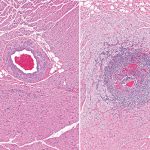NEW YORK (Reuters Health)—Anti-TNF drugs are more likely to improve growth in children with inflammatory bowel disease (IBD) if they’re given in the earlier stages of puberty, new findings show.¹ Children who achieve remission are also more likely to have satisfactory growth, the research team reported online on Sept. 21 in the Journal of Pediatric…
Novel Astrocytic Autoantibody Associated with Relapsing Meningoencephalomyelitis
NEW YORK (Reuters Health)—An autoantibody to glial fibrillary acidic protein (GFAP) is associated with relapsing autoimmune meningoencephalomyelitis that is responsive to immunotherapy, researchers report. “Autoimmune GFAP meningoencephalomyelitis is the second autoimmune neurological disease in which the target of the immune attack is recognized to be the astrocyte type of brain cell,” Dr. Vanda A. Lennon…

Diagnostic Criteria, Classification Lacking for Vasculitis; New Research in Treatment for Systemic Sclerosis
LONDON—Despite the detailed terminology for describing vasculitis established by the Chapel Hill Consensus (CHC) in 2012, the field badly needs better classification and diagnostic criteria for the group of diseases, an expert said in a presentation at the Annual Congress of the European League Against Rheumatism (EULAR 2016). It’s a topic that is now being…

Research on Ixekizumab in Psoriatic Arthritis and More Presented at EULAR 2016
LONDON—Results from the extension phase of a Phase 3 trial for the IL-17A inhibitor ixekizumab in psoriatic arthritis (PsA) show that patients started on placebo, adalimumab and ixekizumab continued to show improvements in arthritis, dactylitis and ethesitis, said Philip Mease, MD, a rheumatologist at Swedish Medical Center University of Washington in Seattle.1 Dr. Mease presented the…
Psoriasis May Carry Atherosclerosis Risk Similar to that with Diabetes
(Reuters Health)—People with psoriasis may be at increased risk of coronary artery calcium buildup, comparable to that of people with diabetes, according to a new study. Comparing people in their 50s with psoriasis, diabetes or neither disease, researchers found that moderate to severe calcium buildup was about five times as common in people with diabetes…
European Group Offers Guidance on Managing Juvenile Dermatomyositis
NEW YORK (Reuters Health)—A European working group has formulated consensus-based recommendations for the diagnosis and treatment of juvenile dermatomyositis (JDM) with the goal of producing a “standard of care” for patients with JDM throughout Europe. The group is part of a European initiative called SHARE [Single Hub and Access point for pediatric Rheumatology in Europe]…

Resarch Into IgG4-Related Diseases Expands Knowledge Base, Leads to Effective Treatments
CHICAGO—Researchers have come to know a great deal about IgG4-related disease in a short amount of time, leading to effective treatments with the prospect for more, an expert said at the 2016 State-of-the-Art Clinical Symposium. “One of the most exciting things for me is how quickly we’ve been able to move in understanding this disease,”…

Ultrasound May Be Useful for Grading Rotator Cuff Tendinopathy
Researchers have developed procedures and assessed their efficacy for the use of ultrasound images to measure the inter-rater reliability of the measurement of structural changes in the tendon of patients with supraspinatus tendinopathy. The standardized procedures proved useful in evaluating patients…

New Assays May Help in the Diagnosis & Management of Antiphospholipid Syndrome
A new study found that measuring the presence of additional antibodies specific for Domain I (aDI) of β2-glycoprotein (β2GPI) may improve the diagnosis of antiphospholipid syndrome. Based on their findings, researchers conclude that aDI tests may be a useful addition to, but not a replacement for, standard aβ2GPI tests…
Valeant Psoriasis Drug’s Suicide Risk Hard to Assess, Say FDA Staff
(Reuters)—Valeant Pharmaceuticals International Inc.’s experimental drug to treat psoriasis carries a potential risk of suicide that is challenging to assess due to limited data, a preliminary review by the U.S. Food and Drug Administration said on Friday. The review comes two days ahead of a meeting of outside experts who will advise the FDA on…
- « Previous Page
- 1
- …
- 20
- 21
- 22
- 23
- 24
- …
- 37
- Next Page »